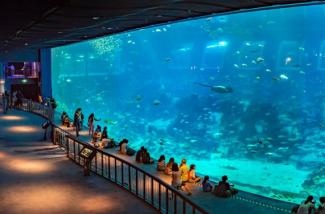
Singapore, 29 November 2019 (Friday) – The Institute of Service Excellence (ISE) (卓越服务研究院)at Singapore Management University (SMU) today released the 2019 third quarter (Q3) Customer Satisfaction Index of Singapore (CSISG) results for the Food & Beverage and Tourism sectors.
In the latest results, the Food & Beverage sector scored 76.9 points on a 0 to 100 scale. This was a remarkable 3.6% improvement over last year. The Tourism sector scored 75.8 points, a more modest 0.9% improvement over the previous year. Both improvements were statistically significant and the performance represented record highs for both industry sectors since they were tracked on the CSISG in 2007.
However, the broad improvements in customer satisfaction was tempered with mixed performance in customer loyalty levels: Of the six sub-sectors measured in the Food & Beverage and Tourism sectors, only one, Restaurants, recorded a significant year-on-year improvement; three posted relatively smaller upticks in performance, while two recorded lower scores.
Mr Chen Yongchang (陈勇畅), Head of Research and Consulting at ISE, said, “The significantly higher levels of satisfaction is a testament to the effort the industry has invested into improving customer experience.
“The challenge now will be to transition these positive sentiments into improving loyalty metrics, such as higher customer repurchase intentions and the ability to better tolerate price changes,” he observed.
Food & Beverage
The Food & Beverage sector saw customer satisfaction scores for all four of its constituent sub-sectors increased year-on-year, continuing the trend of steady increments for the fifth consecutive year.
While the sub-sectors of Cafes & Coffee Houses, Fast Food Restaurants, and Snack Bars & Food Kiosks recorded small upticks to score 74.8, 74.6, and 75.9 points respectively, the Restaurants sub-sector drove sectoral improvements, scoring a record 78.3 points, a 5.2% year-on-year improvement.
Delving into the Restaurants sub-sector, it was observed the customer segment driving the strong performance came from local diners. Local diners surveyed saw higher scores and ratings across the board, with improvements in key areas such as perceived quality, service staff, and ordering. Conversely, tourist diners surveyed were observed to have generally lower scores and ratings when compared year-on-year and against local diners.
Mr Chen remarked, “At the overall level, there was a lot of positivity in the Restaurants sub-sector this year. However, the tourist customer segment was observed to be its Achilles’ heel.
“Tourist customers are a somewhat trickier segment to serve well given their transient nature. Nonetheless, our analysis suggests restauranteurs can focus on staff and product-related areas such as ‘Proactiveness of staff in offering help’, ‘Staff provides prompt and quick service’, and ‘Food served within a reasonable time’ - these were the three most important attributes to tourists’ perceptions of quality at a restaurant,” he added.
Tourism
The Tourism sector also saw improved customer satisfaction in 2019, with both its constituent sub-sectors posting higher CSISG scores: The Attractions sub-sector scored 75.1 points, a statistically significant 1.4% year-on-year improvement, while the Hotels sub-sector performed similar to last year, scoring 75.9 points.
The Hotels sub-sector’s lacklustre performance revealed a more concerning issue upon closer analysis: Perceived Quality and Value have risen substantially in the past two years but Loyalty, i.e., guests’ propensity to stay again at the hotel and their willingness to pay more for their stay, has declined. Compared to 2017, Hotel guests’ Perceived Quality and Value rose 1.9% and 5.7% respectively, while Loyalty declined by 2.0%.
Ms Neeta Lachmandas (妮塔.拉切曼达斯), Executive Director (执行总监) of ISE, said “Given the ubiquity of hotel booking apps and sites, consumers may be making accommodation choices based increasingly on price. This may explain the relatively stronger improvement in perceptions of value.
“Ultimately however, businesses will want to build a relationship where the customer would like to come back again. Therefore, focusing on price as the lever will not be sustainable,” she commented.
Impact analysis of the Hotels sub-sector suggest hoteliers should focus on both product tangibles, such as ambience and in-room amenities, and service, such as staff’s ability to provide guests with useful recommendations, to drive improvements in customer loyalty.
A similar finding was also seen in the Attractions sub-sector. While it performed well across most measured metrics, with key drivers of satisfaction such as Perceived Quality and Value improving year-on-year, levels of Customer Loyalty also dipped marginally by 0.7% year-on-year.
Notwithstanding the softness in the Attractions’ Loyalty score, its positive performance in customer satisfaction came primarily from local respondents. Attractions were observed to be better able to meet and exceed local visitors’ expectations of quality this year, compared to 2018. Further analysis also revealed these domestic customers provided higher ratings across several quality attributes such as ‘Quality and Value of F&B’, ‘Range of Activities’, and ‘Entertainment & Education Value’.
The CSISG 2019 Q3 study was conducted between July and October 2019. A total of 6,800 respondents, comprising 2,955 locals and 3,845 tourists, were surveyed.
Please refer to Annex A for a background on the CSISG and Annex B for the detailed scores.
For media queries, please contact:
Mr Tim Zhuang
Senior Manager, Partnerships and Programme Development
Institute of Service Excellence (ISE) at Singapore Management University
DID: (65) 6808 5258
Mobile: (65) 9748 9389
Email: timzhuang [at] smu.edu.sg (timzhuang[at]smu[dot]edu[dot]sg)
Mr Teo Chang Ching
Senior Assistant Director, Corporate Communications
Office of Corporate Communications and Marketing
DID: (65) 6828 0451
Mobile: (65) 9431 8353
Email: ccteo [at] smu.edu.sg (ccteo[at]smu[dot]edu[dot]sg)